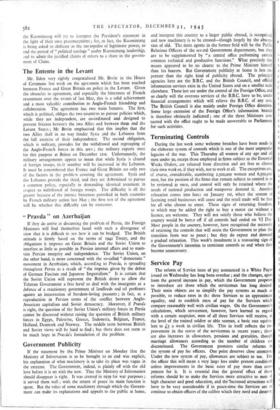“Pravda " on Azerbaijan
If they do arrive at discussing the problem of Persia, the Foreign Ministers will find themselves faced with such a divergence of view that it is difficult to see how it can be bridged. The British attitude is firmly based on the terms of 1942 Treaty, and the obligations it imposes on Great Britain and the Soviet Union to interfere as little as possible in Persian internal affairs and to main- tain Persian integrity and independence. The Soviet Union, on the other hand, is more concerned with the so-called " democratic " movement in Azerbaijan, which, according to Pravda, is spreading throughout Persia as a result of " the impetus given by the defeat of German Fascism and Japanese Imperialism." It is certain that the Soviet Union will represent the British desire to allow the Teheran Government a free hand to deal with the insurgents as a defence of a reactionary government of landlords and oil profiteers against an insurrection of freedom-loving peasants ; in fact, as a reproduction in Persian terms of the conflict between Anglo- American capitalism and Soviet democracy. Moreover, if Pravda is right, the question of the Soviet Union's military forces in Persia cannot be discussed without raising the question of British military forces in Egypt, Palestine, Greece, Indonesia, Belgium, France, Holland, Denmark and Norway. The middle term between British and Soviet views will be hard to find ; but there does not seem to be much hope in Pravda's formulation of the problem.






























 Previous page
Previous page